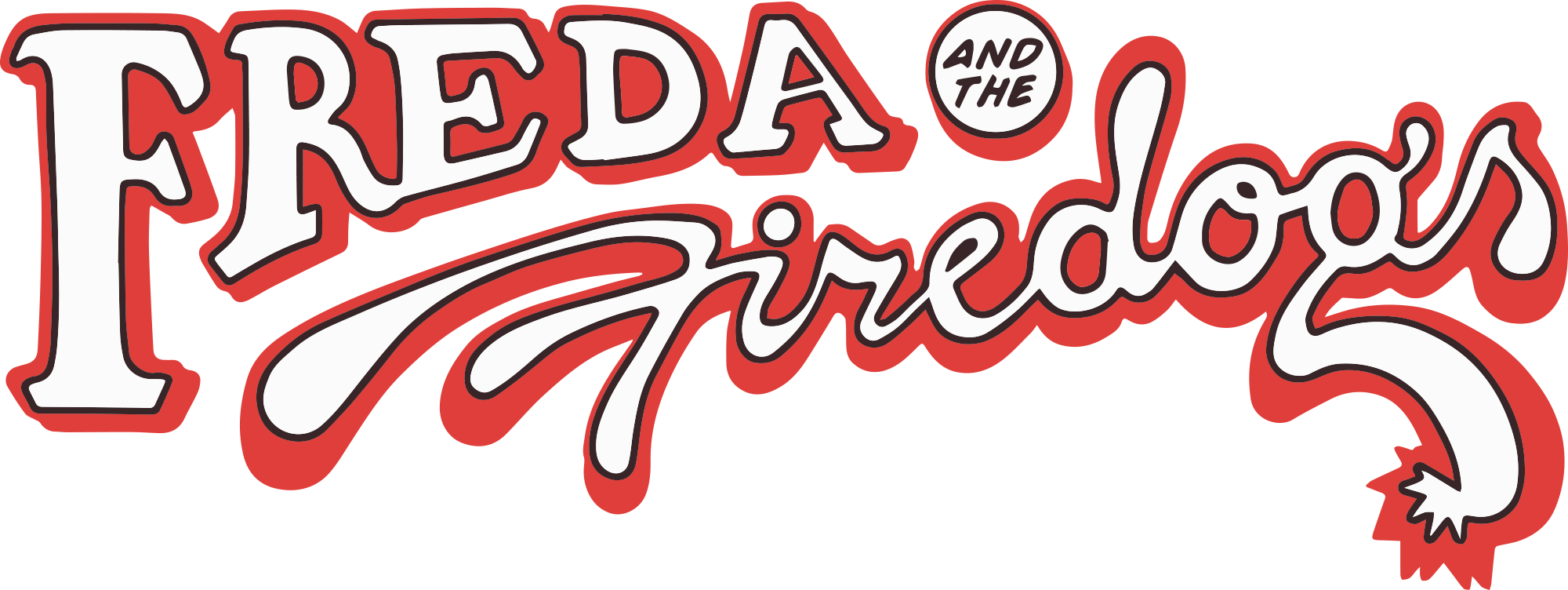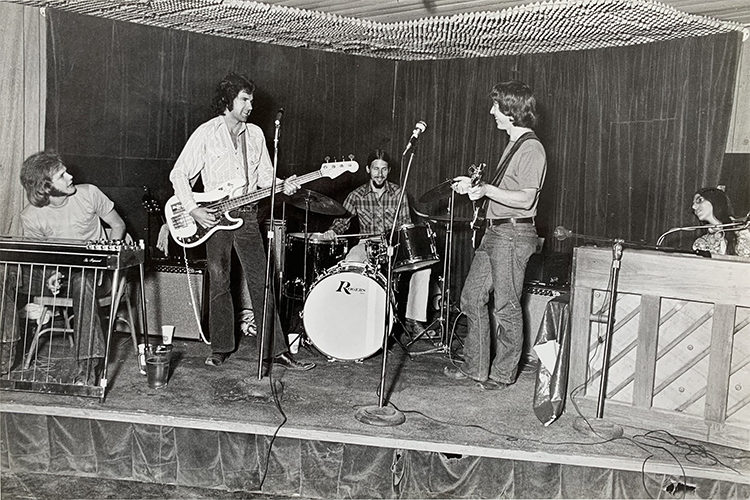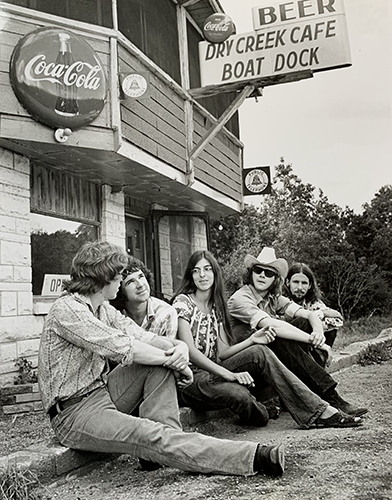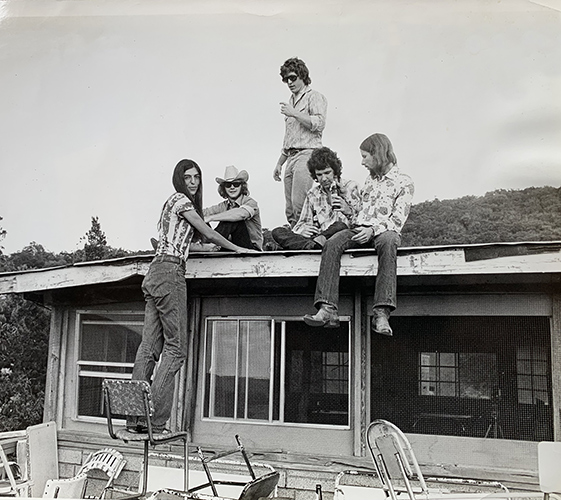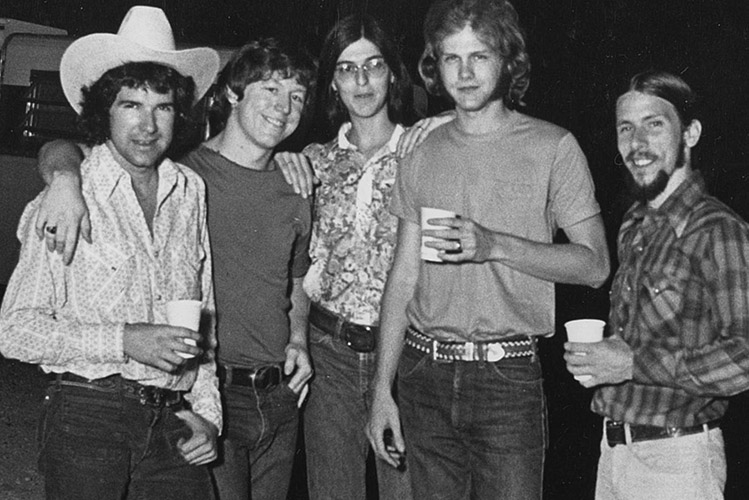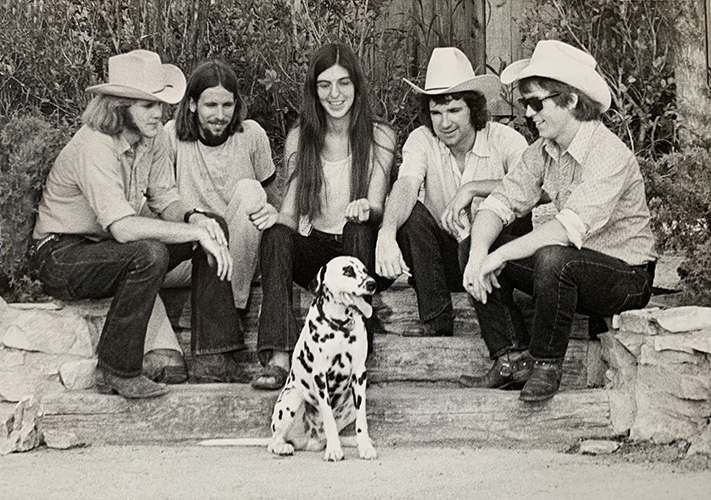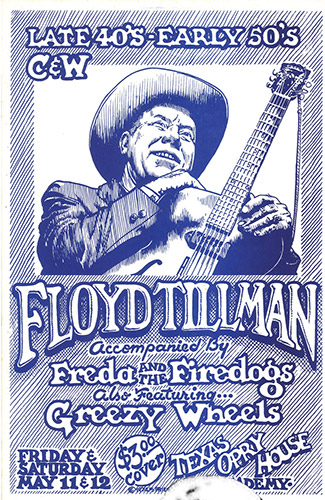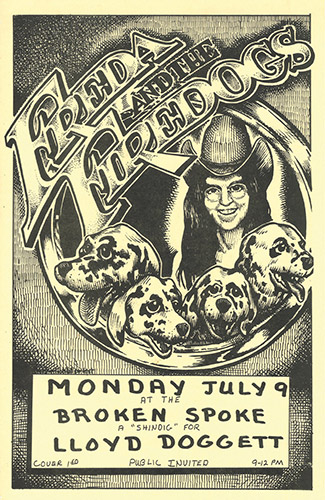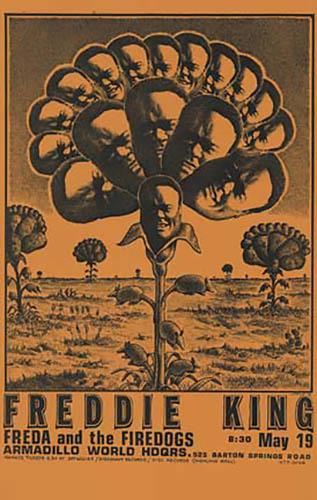Marcia Ball John X Reed Bobby Earl Smith Steve McDaniels David Cook
MUSIC
VINYL RE-ISSUE
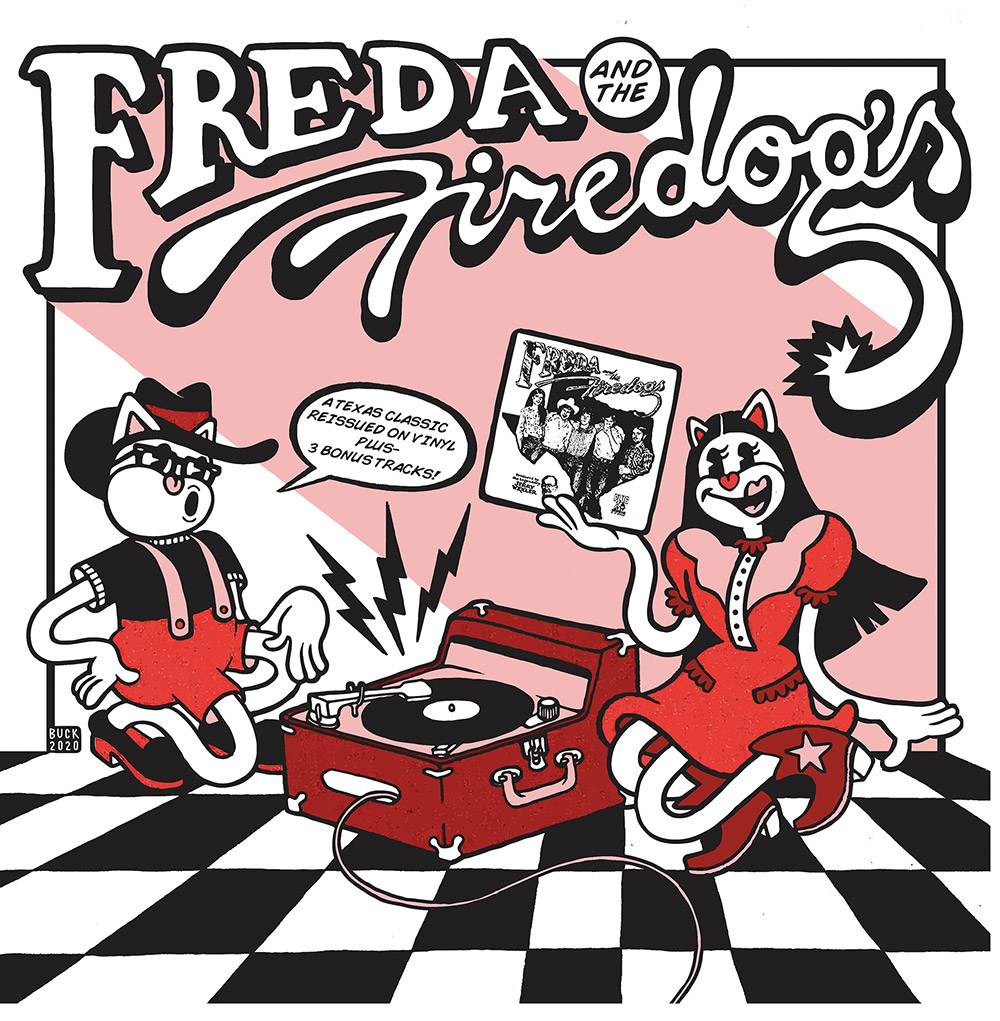 Freda and the Firedogs (2021)
Freda and the Firedogs (2021)
• A Texas Classic Reissued On Vinyl
• Plus 3 Bonus Tracks recorded
at Sugar Hill Studios, Houston, Texas,
Febrary 1974, Produced by Huey Meaux,
Engineered by Roger Harris.
SIDE ONE
1. Make Me a Pallet
2. Cold Wind
3. When You Come Home Again
4. Your Good Girl’s Gonna Go Bad
5. Dry Creek Inn
6. Fist City
7. Stand By Your Man
SIDE TWO
1. EZ Rider
2. The Only Thing Missing Is You
3. Jambalaya
4. Marcia’s Song
5. Today I Started Loving You Again
6. Just As Hard
7. I Must Have Been Out Of My Mind
8. Muleshoe
AVAILABLE ON CD
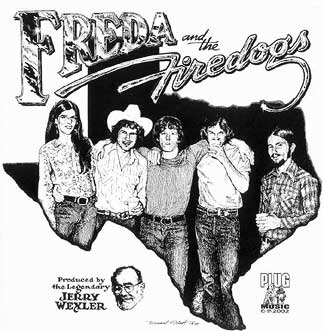 Freda and the Firedogs (2002)
Freda and the Firedogs (2002)
• Recorded August 10-12, 1972 at
Robin Hood Studios, Tyler, Texas
• Produced by Jerry Wexler
• Recording Engineer - Robin Hood Brians
• Mastered at Terra Nova Digital Audio
by Joe Gracey and Jerry Tubb
• Art by Micael Priest
• Photos by Burton Wilson
• Layout - Joe Gracey
TRACK LIST
1. Make Me a Pallet
2. Cold Wind
3. When You Come Home Again
4. Your Good Girl’s Gonna Go Bad
5. Dry Creek Inn
6. Fist City
7. Stand By Your Man
8. EZ Rider
9. The Only Thing Missing Is You
10. Jambalaya
11. Marcia’s Song
12. Today I Started Loving You Again
REVIEWS

Ken Lieck, Austin Chronicle, October 11, 2002
“Freda & the Firedogs is one of the greatest albums in Austin music history. A record that was set to give major national exposure to the then-fresh outlaw country movement in Texas.” READ MOREREAD LESS
Freda & the Firedogs is one of the greatest albums in Austin music history. A record that was set to give major national exposure to the then-fresh outlaw country movement in Texas.
The band consisted of Marcia Ball, John X. Reed, Steve McDaniels, David Cook, and Bobby Earl Smith, and in the early part of 1972 legendary producer Jerry Wexler, who'd already signed Doug Sahm and Willie Nelson, took a shine to them, and had them record an album for Atlantic. Unfortunately, says Smith, "We were trying to make sure and get a good deal, and we hemmed and hawed too long. We ended up putting Jerry in a kind of a bad light at Atlantic," and the deal was never signed.
The album was forgotten, the band members lost their personal copies over the years, and then, not long before Sahm's death in 1999, Smith called him and got Wexler's number in hopes of finally releasing the album more than a quarter-century after it was recorded. Unfortunately, Wexler reported that the master tapes had been lost in a warehouse fire. "My heart sank," gulps Smith, but then Wexler added that he had managed to keep track of his personal copy of the reel to reel tape. Following a bit of EQ-ing and the limited corrections that could be made to the original recording, Smith has had a limited number of copies pressed up for Austin release, with national distribution to follow.
And if you didn't guess that rumblings of a reunion are already buzzing, shame on you! Smith says he's talking to Ball this week about putting together some shows at the Broken Spoke, Gruene Hall, and elsewhere.

Townsend Miller, Austin American-Statesman, July 22, 1972
“It would be difficult to over-praise Freda and the Firedogs. This is a great bunch of youngsters, both personally and musically. They stick closely to the traditional and their brand of country music is pure listening pleasure.” READ MOREREAD LESS
It would be difficult to over-praise Freda and the Firedogs. This is a great bunch of youngsters, both personally and musically. They stick closely to the traditional and their brand of country music is pure listening pleasure.
Freda, whose real name is Marcia Ball, plays fine piano. More important, her beautiful voice is…well, I just never heard any better. It has a lovely, melodious quality that is rare. And Marcia knows how to interpret and sing a country song. Her vocals are simple and honest, and they’re simply and honestly great.
The first time I heard the Firedogs, something most unusual happened. With my ear tuned to spot the individual talent of some single musician, the first who impressed me was, surprisingly, the bass player. He is Bobby Earl Smith, who also sings many of the vocals.
Equally talented is another member who plays what often is considered a “minor” instrument in the band, drummer Steve McDaniels. The quality goes on and on. John Reed, lead guitarist and vocalist, has a reputation around town as a “musician’s musician.” And you David Cook plays the steel guitar in the classic manner of the older masters, a welcome pleasure in these days of the often too-gimmicky steels of the moderns Nashville sound.
The Firedogs, featuring Freda’s (Marcia’s) piano and lovely vocals, are a solid country group, strong on the traditional but with a lively young flare.

Margaret Moser, Austin Chronicle, December 13, 2002
Nowhere but Texas
Thirty years later, Freda & the Firedogs still didn't sign the contract READ MOREREAD LESS
At first, the fire is hidden in the smoke. Twelve bell-bottom bluesy country songs on a new CD, produced for vinyl in 1972 by Atlantic Records legend Jerry Wexler, performed by progressive country pioneers Freda & the Firedogs for a debut that never came out. So what's all the hoo-hah about?
It's a question worth asking.
Austin's fabled music scene is built on a foundation of outlaw country twisted around psychedelic roots. Musical styles and recording techniques have changed vastly over the last 30 years, and Freda and the Firedogs bears the distinct stamp of the past. It's an almost breezy, country-tinged affair, hardly a harbinger of the rowdy times to come.
Then again, it's worth remembering what a hippie haven Austin was back when Marcia Ball, Bobby Earl Smith, John X Reed, Steve McDaniels, and David Cook packed the Split Rail on Sundays as Freda & the Firedogs. The One Knite was open, but not Soap Creek Saloon ... the Armadillo World Headquarters, but not the Opera House. Tequila was 35 cents a shot, the beer of choice was Lone Star or Shiner (not Bock), and punk was still a prison term. A favored bumper sticker of the times: "Long Hair and Longnecks -- Nowhere but Texas."
Marcia Ball is blunt about why it took three decades for the album's release.
"The contract stunk!" laughs Ball. "It was one of those old-fashioned, multi record deals. If we could have found someone to advise us, we'd have been in better shape."
Smith attributes the band's balking to the times, when anti-establishment interests were suspect. Without legal advice, the band had no feedback other than Wexler's word and good reputation. Ball sent the contract to a Memphis lawyer who didn't even read it.
"He said, 'Oh, it's Jerry Wexler,'" remembers Ball. "' Sign it.'"
Wexler's rep was good, especially in Austin: He signed both Doug Sahm and Willie Nelson. Hell, he signed Aretha Franklin and Led Zeppelin! Why shouldn't Freda & the Firedogs take a chance? Smith says a deciding factor was the too-much-too-soon syndrome.
"The band began in March 1972, and by August, we were recording," explains Smith. "Doug Sahm had said, 'Hey man, I know Jerry Wexler, and I can set you up with this deal, man.' And it happened so quickly. It seemed too easy, and we made it hard."
Two years ago, Wexler recalled the Firedogs fiasco to the Chronicle.
"There was paranoia running throughout the country, 'Be real careful, because those sharpies from New York are going to fuck you; they're going to suck your life's blood.' [The band] got to where they never would sign the contract. Never signed the contract ..."
Freda & the Firedogs did sign and eventually return the contract, but by then, the bloom was off the rose. "We'd exhausted his considerable Jewish forbearance and patience," Smith notes ruefully. The tapes were shelved in the Atlantic vaults.
What value might a record unreleased 30 years ago have today? Plenty. Aside from being a mini time capsule opened for cosmic delight, Freda & the Firedogs reveal themselves to be among the godparents of Austin's prodigious roots-music obsession.
"People focus on progressive country," admits Smith. "We'd play country, but we'd play blues, rock & roll, a song by Angela Strehli. It wasn't really country, it was roots music."
Carlyne Majer is past president of the National Association of Recording Arts & Sciences Texas Chapter. Back then, she and husband George Majewski ran Soap Creek Saloon. Majer also managed Ball's post-Freda career and signed her to Capitol Records in the late Seventies. She's amazed that "that form of music from an Austin group would be perceived by Jerry Wexler to have tremendous value. But they set a precedent for hip country music."
"In listening to the radio around here, you can hear what was in the air then," posits Ball several W.C. Handy Awards and Grammy nominations later. "You read about Austin music in the Seventies. The band was a big part of that, but there was nothing to hear. Once I suggested finding something to release, Bobby Earl ran with it."
"What a gentleman Wexler is!" Smith effuses. "I called him and introduced myself, saying I was with Freda & the Firedogs. 'Bobby Earl, I know who you are,' he said. He told me the master tapes burned up in a fire in the Atlantic vault years ago. I could hear tape boxes shuffling. He said he couldn't find his own personal copy, but could he call me back. Five minutes later, the phone rang and he said, 'I've got 'em. You want 'em? Let me make a call to Atlantic.' That was the extent of my negotiation."
Jerry Wexler did, however, let Bobby Earl Smith know -- amicably -- just what kind of faith he had in the band. "'You really fucked up by not signing the contract.'"
"I don't think we would have become the Byrds or Asleep at the Wheel," muses Ball. "Don't think we'd still be playing that music. The band ran its course. The album would have been a finished product to represent the band, and I regret we didn't have that then."
Smith feels the same way.
"I'm not one for looking backward. My life has been great. I've been married 37 years and have two wonderful boys and wouldn't trade that for anything. If we'd hit that pot of gold, I'd have been on the road, and it would have been a different story.
"But what a wonderful time that was."

John Kelso, Statesman, September 24, 2016
"Freda and the Firedogs brought harmony to the two disparate factions. The music brought together the flower children and the boot scooters and created, you got it, Willie Nelson." READ MOREREAD LESS
Freda and the Firedogs band older, grayer but back
So who should we send to the U.N. to promote world peace?
How about Freda and the Firedogs, the Austin band who will play a couple of reunion concerts next weekend: a Saturday night tribute to Doug Sahm at the Paramount Theatre and a Sunday night show at the Broken Spoke.
In the early 1970s, Freda and the Firedogs managed to bring Austin’s hippies and good ol’ boys together with their music — no small feat.
Back in the day, these two groups weren’t exactly a match made in heaven. One bunch honored the Marlboro Man, while the other paid homage to the Zig-Zag man. One group favored long hair, while the other loved long hair — on girls. One enjoyed country music, the other side preferred Country Joe and the Fish.
Back then, if your band showed up on a black light poster, you didn’t play at the Spoke, the ancient honky-tonk on South Lamar Boulevard. Ernest Tubb? Sure. The 13th Floor Elevators? Take a hike.
Freda and the Firedogs brought harmony to the two disparate factions. The music brought together the flower children and the boot scooters and created, you got it, Willie Nelson.
“I always tell people that we integrated the Broken Spoke for longhairs,” said Bobby Earl Smith, who plays bass for the band.
It took Bobby Earl lots of work and time to get Freda and the Firedogs a gig at the Spoke. He says he pestered James White, the Spoke’s owner, and Joe Baland, who helped James build the place in the 1960s, for a year. “They were always very welcoming and very courteous, and they wouldn’t tell me no. But they wouldn’t tell me yes,” Bobby Earl recalled.
Then Bobby Earl got lucky. U.S. Rep. Lloyd Doggett, who in 1973 was running for state Senate, was putting together a campaign rally at the Broken Spoke. He needed a band. Bobby Earl got the call. So Freda and the Firedogs played Doggett’s party.
It was a Monday night, when the Spoke was usually closed. Still, the joint was packed.
James White was impressed. “He said, ‘If a long-haired band can pull in 500 hippies on a Monday night, I’ll give ‘em a gig,’” Bobby Earl recalled.
White gave them more than a gig, actually. He started booking the band regularly.
The good old boys who frequented the Spoke ate it up, for a couple of reasons. “We weren’t a hippie band playing hippie music. We were a hippie band playing traditional country,” Marcia Ball, the band’s vocalist and keyboard player, explained. “And we played dance music. That was the key. As long as they could dance to it, it was OK.”
And James White got a kick out of observing his new customers. Instead of dancing backwards, country style, the hippies did a dance James labeled “the hippie hop.”
“They would always dance real fast, and it was kinda like a hoedown,” James recalled. “The hippies thought they had to jump up and down, and then they’d go around as fast as they could and then they went barefoot.”
There was one tense moment for Bobby Earl, however.
“The first time we played at the Spoke, we took a break outside, and we were relaxing a little bit,” said Bobby Earl, “relaxing” being code for smoking a fatty. “And here comes James White, and I thought I worked a year to get this job and now I’m going to lose it. But he never said a word.”
Next weekend will be the first time the entire band has played together in 36 years. But it shouldn’t be a problem. Everybody’s been practicing, to make sure they remember the songs. And some of the band members are still performing.
John X Reed, a respected Austin blues picker, plays “geezer hour at the Saxon (Pub),” Bobby Earl said. “I love geezer hour, you know. That’s doable.”
Steve McDaniels, the drummer, has a day job for an insurance company. David Cook, the pedal steel guitar player, teaches music in Florida. Bobby Earl, on bass, is a defense attorney trying to retire. “So if you’re going to commit a crime you better hurry up and do it, because I’m on my way out,” he said.
And Marcia Ball is still Marcia Ball, pounding the piano.
So what’s the average age of the group? “About 93,” Bobby Earl joked. “I told somebody, ‘Be careful when you come in. Don’t trip over the walkers and canes.’”
And don’t worry about some ol’ cowpoke in the audience belting a guy sporting a grey ponytail with his walker. Freda and the Firedogs brought detente to that misunderstanding decades ago.
BIOGRAPHY
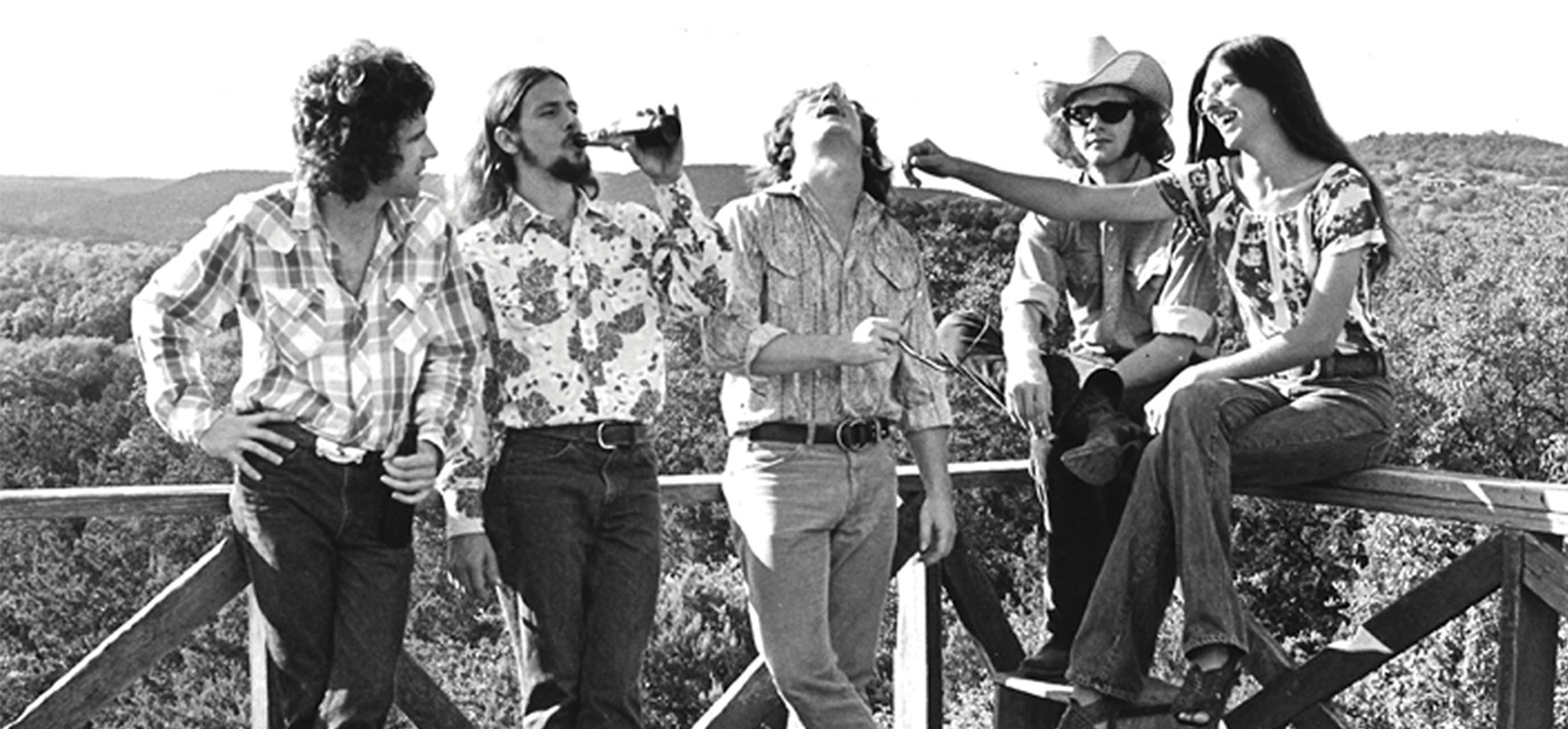
Marcia Ball - piano and vocals
John X Reed - guitar and harmony vocals
Bobby Earl Smith - bass and vocals
Steve McDaniels - drums
David Cook - steel guitar and rhythm guitar
Freda and the Firedogs by Joe Nick Patoski
I don’t know about you but for me this strange thing called Texas music didn’t begin with Willie, with “Goin’ home with the Armadillo,” with progressive country, cosmic cowboys, outlaws, or redneck rock.
It began long before all that in a low-ceilinged beer joint in near South Austin called the Split Rail where every Sunday night the faithful would gather to fill every seat, line the walls, and occupy every square inch of available space to witness Freda and the Firedogs, four young guys from Texas and a long-legged gal from Louisiana, who happened to be C&W and rhythm and blues purists, who also happened to be unabashed bohemians smarter and hipper than honky-tonkers were supposed to be.
It was all young, so fresh, so totally cool. The band and the crowd both were aware that something new and completely different was starting to happen in Austin. Soon, the band bridged the cultural gap between the long haired hippies and the traditional country crowd by “integrating” the legendary Broken Spoke, “the greatest honky tonk of all time,” with hippies and rednecks two-stepping in harmony around the dance floor.
Then a real player showed up. Jerry Wexler was and is a music business legend, having discovered Aretha Franklin, Ray Charles, Professor Longhair, and a slew of soulful million-selling acts. He was already on to Austin, having signed Willie Nelson and Doug Sahm to Atlantic Records. But Freda and the Firedogs intrigued him like no other band.
So he made them a proposition: come up to Robin Hood Brians' funky egg-crate rigged little 12 track studio up in Tyler, Texas, the Rose Capital of America, and cut some tracks. So they did, hunkering down for three days in August of 1972 (the same year another little old band from Texas called ZZ Top made their first recordings at the very same studio). It was a laid-back, straight-ahead recording session all things considered. Wexler brought his Immaculate Funk style of production—let the band find the groove and let the tape roll. Robin Hood's mom would cruise through dressed in her bathrobe, checking on the scene (she lived in the house the studio was built behind). Everyone went out and ate Chinese.
Atlantic liked what Wexler sent them. A go-ahead was given to release the demo “as is.” A contract was sent in the mail. But the band hemmed and hawed. They wanted artistic control. They wanted more money, more points--all the things bands were supposed to want. The misgivings and doubts lingered so long that by the time Freda and the Firedogs finally did decide to go ahead and jump off the cliff and sign the deal, it was too late. Atlantic soon deemed Jerry Wexler's Texas experiment a bust.
The band continued for almost another two years. There were regular out-of-town gigs in Lubbock, Dallas, and Houston, and memorable concerts like the “Tribute to the Cosmic Cowboy,” at Hofheinz Arena in Houston, shows when the band backed Doug Sahm, gigs when Willie showed up to sit in. It all ended in a flaming blaze of glory at Willie Nelson's Fourth of July Picnic in 1974, at the Texas World Speedway in Bryan-College Station, Texas, with two guys parachuting into the crowd and cars literally on fire as Marcia waved her cowboy hat and yodeled "Cowboy Sweetheart."
Marcia Ball has gone on to carve out a stellar career as a rhythm and blues solo artist and bandleader, recording more than a dozen albums, touring relentlessly, and winning W.C. Handy Blues Awards and earning Grammy nominations in the process. John X Reed has performed and recorded with Alvin Crow & the Pleasant Valley Boys, Doug Sahm, Roky Erickson, Jesse Taylor, Tommy Hancock & the Supernatural Family Band, the Texana Dames, and the Nortons, and has burnished a rep as the city's finest guitarslinger. He played for seven years with the Denny Freeman Band and is lead singer in his own John X Reed Band with residencies at the Continental Club and C-Boy’s Heart & Soul in Austin. Bobby Earl Smith, post Freda, played with Alvin Crow, Jimmie Dale Gilmore, Butch Hancock, Kimmie Rhodes and the Jackalope Brothers, and the John X Reed band. Smith has released three albums. Steve McDaniels is pursuing an interest in the Latin sound. David Cook is making and teaching music in Florida.
"You really fucked up by not signing the contract, " Jerry Wexler told Bobby Earl over the phone when he called to inquire about obtaining the tape Wexler produced. The original Freda and the Firedogs tapes had long ago burned up in a fire in Atlantic's vaults. The only existing copy was in Jerry Wexler's library, which he happily offered, even though he couldn't help reminding Smith what could've been.
Who knows what would have, could have been? I sure don't. But what I do know is that this recording captures a band, a producer, a place and a time like nothing else could.
The Firedogs had another invitation to the big dance with yet another legendary producer--Huey Meaux, the Crazy Cajun. The sessions at Sugar Hill Studios in Houston in early 1974 yielded stellar cuts but once again the band dithered and walked away without an album release. Three bonus tracks from that session are included on this vinyl record.
Close your eyes, let your mind wander back fifty years and listen to what we all missed.
Joe Nick Patoski,
Author
